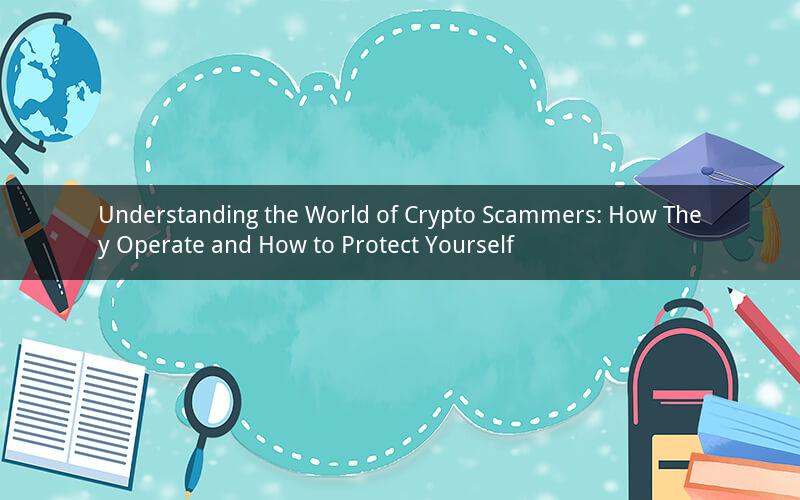
In recent years, the rise of cryptocurrencies has attracted a wave of interest from investors and enthusiasts worldwide. However, this boom has also brought about a dark side: crypto scams. As the digital currency market continues to grow, so does the number of crypto scammers preying on unsuspecting victims. This article aims to shed light on the world of crypto scammers, their methods, and how you can protect yourself from falling victim to their cunning schemes.
1. Who is a crypto scammer?
A crypto scammer is an individual or group of individuals who exploit the anonymity and complexity of cryptocurrencies to defraud others. These scammers use various tactics to deceive victims, including phishing, Ponzi schemes, and fake exchanges. Their ultimate goal is to steal valuable cryptocurrencies, often without leaving a trace.
2. How do crypto scammers operate?
Crypto scammers operate through various channels, including social media, email, and websites. They often target individuals who are new to the cryptocurrency market or those looking to invest in digital currencies. Here's how they typically operate:
a. Phishing: Scammers send fraudulent emails or messages, posing as legitimate crypto exchanges, wallet providers, or other trusted entities. They ask victims to provide their private keys or other sensitive information, which they then use to steal cryptocurrencies.
b. Ponzi schemes: These scams promise high returns on investments in exchange for upfront payments. The scammer pays early investors with funds from later investors, creating the illusion of a legitimate business. Eventually, the scammer vanishes with the money, leaving investors in the lurch.
c. Fake exchanges: Scammers create fake cryptocurrency exchanges, convincing victims to deposit their funds. Once the funds are transferred, the scammer vanishes, and the exchange ceases to operate.
3. How can you protect yourself from crypto scammers?
Protecting yourself from crypto scammers is crucial, as their schemes can be highly sophisticated and difficult to detect. Here are some tips to help you stay safe:
a. Be cautious of unsolicited messages: Never provide your private keys or other sensitive information in response to unsolicited messages. Verify the sender's identity before sharing any personal information.
b. Do your research: Before investing in any cryptocurrency or using a service, do thorough research to ensure its legitimacy. Check reviews, forums, and social media to get a sense of the community's perception of the service.
c. Use secure wallets: Store your cryptocurrencies in a secure wallet, such as a hardware wallet or a reputable software wallet. Avoid using exchanges to store your funds, as they are more susceptible to hacking.
d. Keep your software up to date: Regularly update your computer and mobile device software to protect against vulnerabilities that scammers may exploit.
e. Educate yourself: Stay informed about the latest crypto scams and tactics used by scammers. The more you know, the better equipped you'll be to recognize and avoid them.
4. Common crypto scams to watch out for
a. Phishing: As mentioned earlier, phishing is a common method used by crypto scammers. Be wary of emails or messages asking for your private keys or other sensitive information.
b. Fake ICOs (Initial Coin Offerings): Scammers create fake ICOs, promising high returns on investment. Be cautious of projects with little to no background information or those that ask for large upfront payments.
c. Pump and dump schemes: These scams involve manipulating the price of a cryptocurrency to drive up demand, then selling off their holdings at a profit. Be wary of sudden spikes in a cryptocurrency's price without a clear reason.
d. Fake wallet providers: Scammers create fake wallet providers, convincing victims to deposit their cryptocurrencies. Once the funds are transferred, the scammer vanishes, and the wallet ceases to operate.
5. What to do if you become a victim of a crypto scam
If you believe you have become a victim of a crypto scam, take the following steps:
a. Contact the authorities: Report the scam to local law enforcement and any relevant regulatory agencies. Provide them with as much information as possible, including any communication you've had with the scammer.
b. Freeze your accounts: If you have used an exchange or wallet, contact the provider and request that they freeze your account to prevent further fraudulent activity.
c. Change your passwords: Update your passwords for all online accounts, especially those related to cryptocurrencies.
d. Monitor your accounts: Keep a close eye on your financial and cryptocurrency accounts for any unusual activity.
e. Learn from the experience: Take the time to understand how the scam occurred and how you can prevent similar incidents in the future.
In conclusion, the world of crypto scammers is a dangerous and ever-evolving landscape. By staying informed, cautious, and vigilant, you can protect yourself from falling victim to their cunning schemes. Remember to do your research, use secure wallets, and keep your software up to date to ensure a safe and enjoyable cryptocurrency experience.